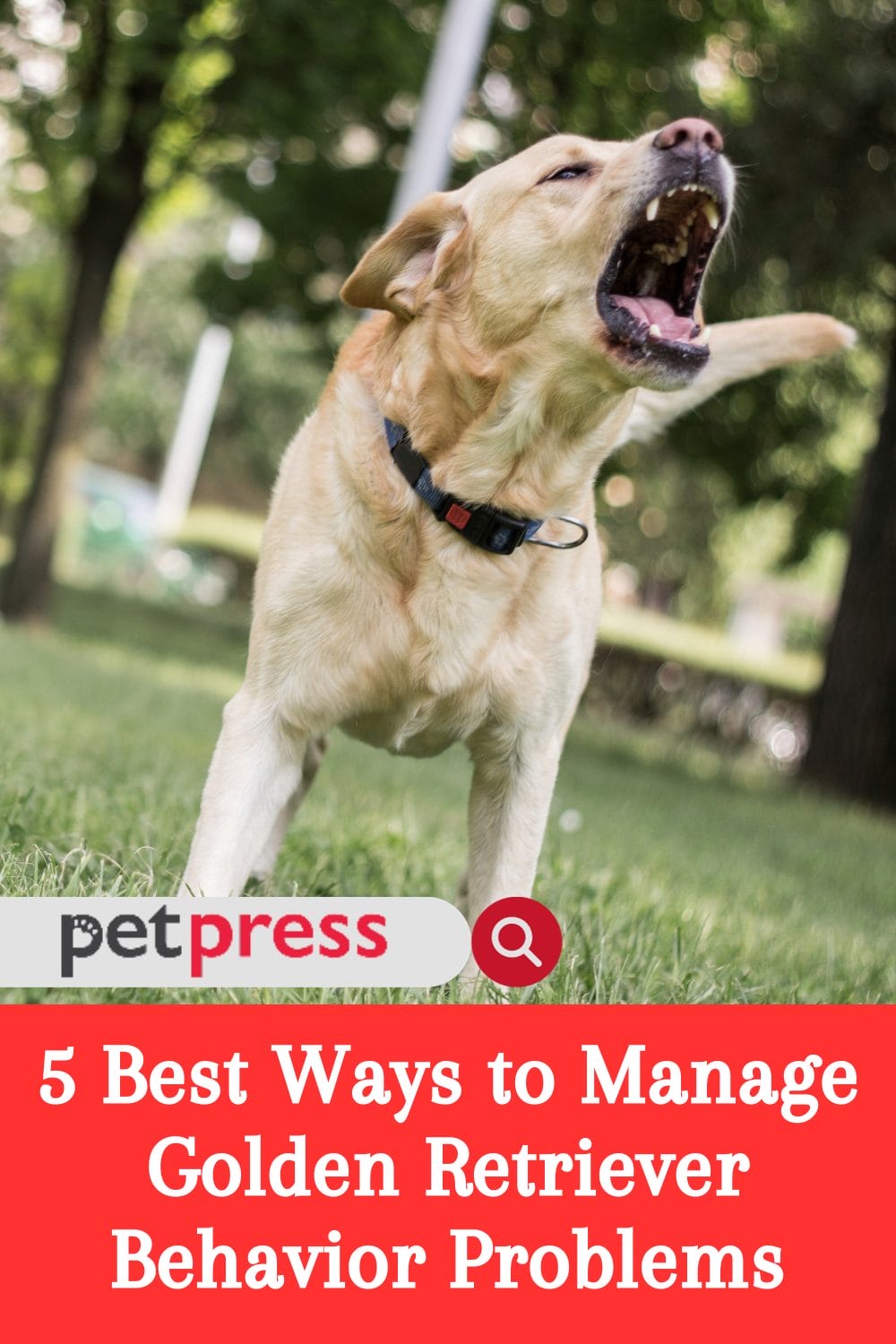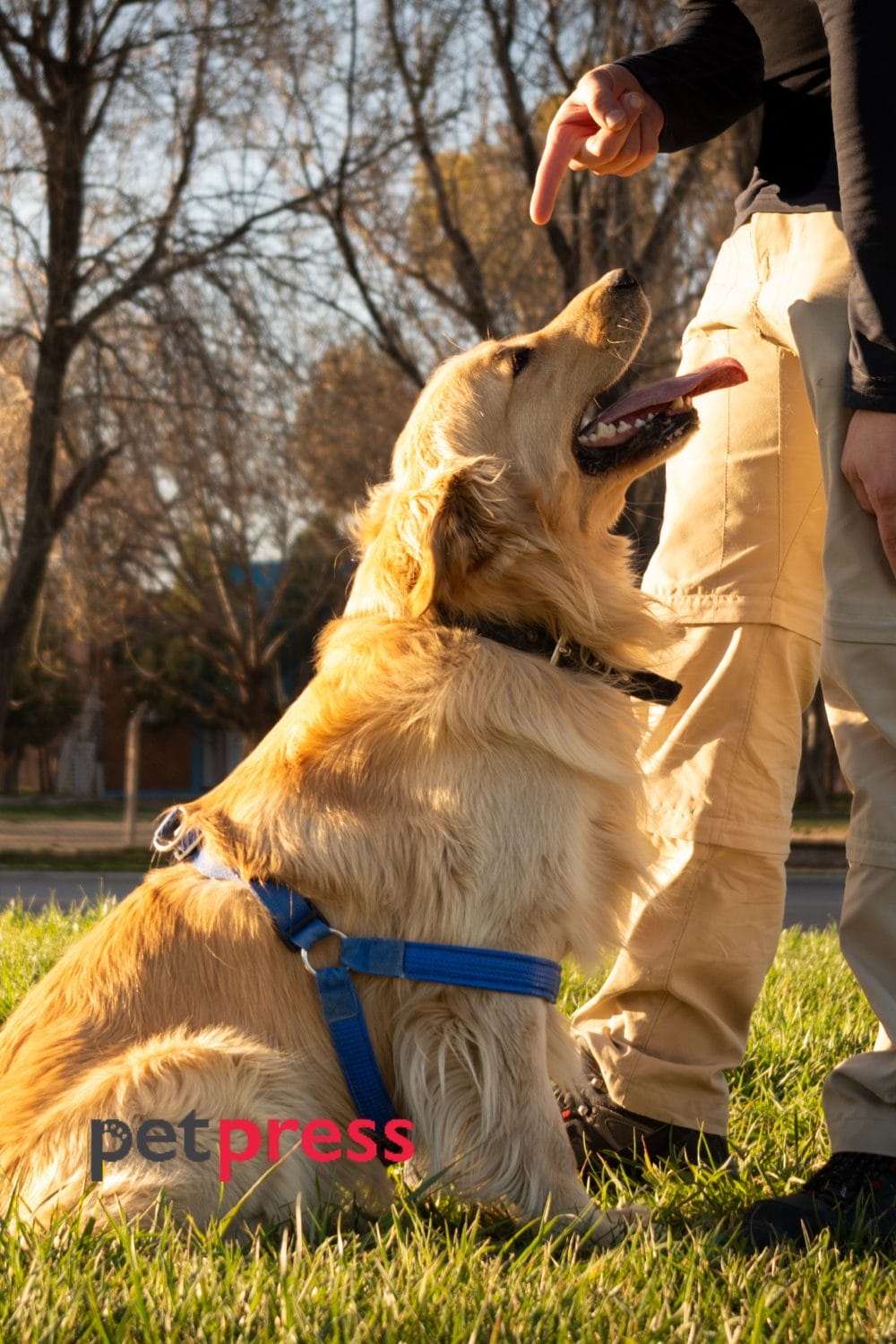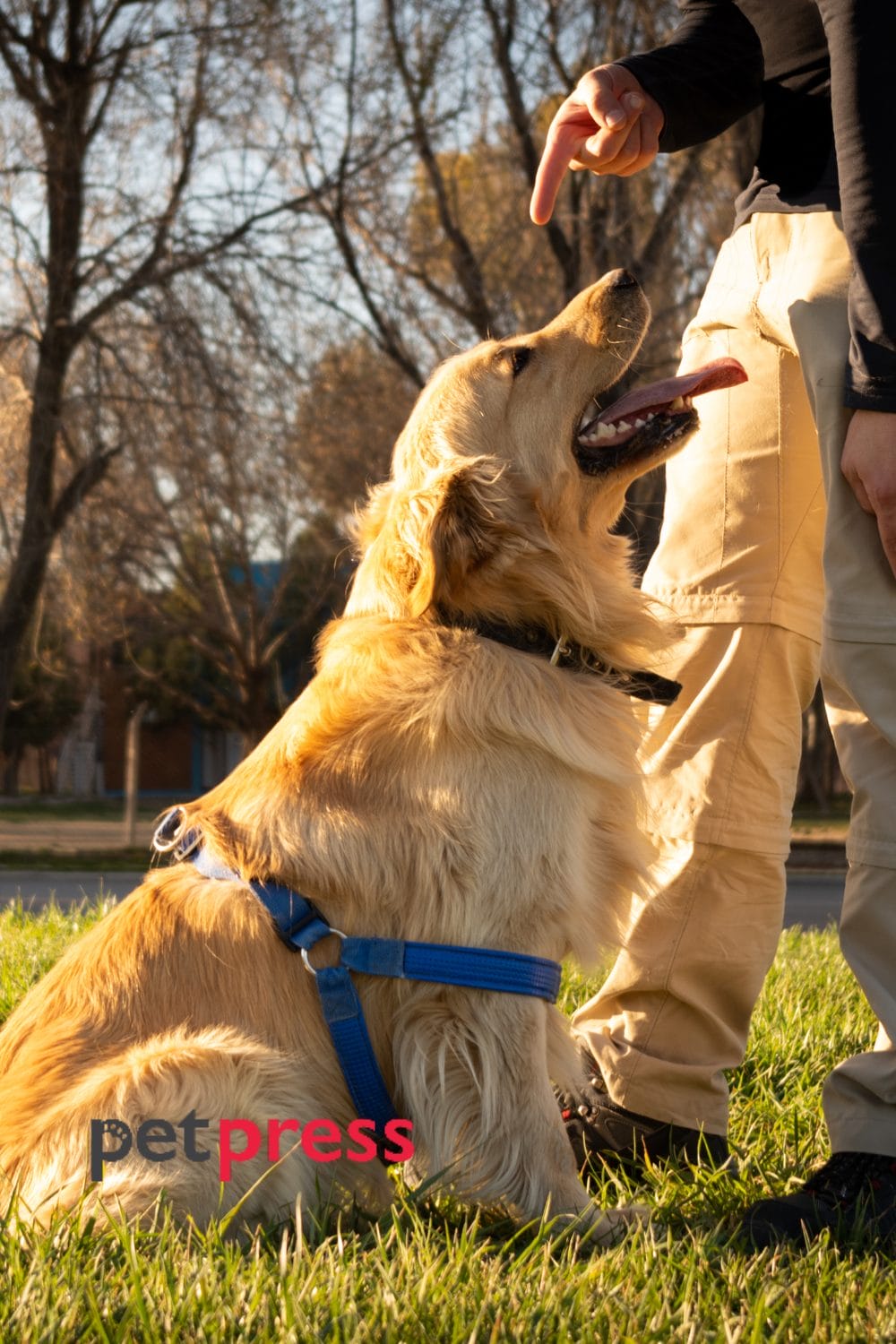
Golden Retrievers are adored pets, renowned for their gentle nature, intelligence, and unwavering loyalty. However, like any other dog breed, Golden Retriever behavior problems they may exhibit can pose challenges for pet owners.
Get ready to dive into the intriguing world of Golden Retrievers! In this captivating blog post, we’ll unveil these lovable companions’ common behavioral challenges.
But fear not! We’ll equip you with practical advice to tackle and conquer these hurdles effectively. Whether you’re a proud new owner or have cherished your Golden Retriever for years, this guide will empower you to nurture a vibrant and rewarding bond with your furry friend.
Let’s embark on this adventure together!

Fascinating Trivia about Golden Retrievers
Golden Retrievers are captivating canines, boasting a storied past and distinctive traits. Delve into these intriguing tidbits about these remarkable dogs:
Origin:
Originating in Scotland during the mid-19th century, Golden Retrievers were meticulously bred by Lord Tweedmouth. His vision was to develop a versatile breed adept at retrieving games from both land and water.
Retrieving Excellence:
Golden Retrievers are aptly named for their exceptional retrieving abilities. With their gentle mouths and instinct to fetch objects, they make excellent companions for various activities such as hunting, swimming, and playing fetch.
Versatile Working Dogs:
Golden Retrievers are not only excellent family pets but also versatile working dogs. They are widely used as guide, search, rescue, therapy, and even assistance dogs for individuals with disabilities.
Friendly and Gentle:
Golden Retrievers are celebrated for their amiable and tender temperament. They typically establish harmonious relationships with individuals of every age, including youngsters and strangers. Their friendly nature makes them more inclined to welcome intruders with wagging tails instead of hostility.

Intelligent and Easy to Train:
Golden Retrievers are super intelligent and always eager to please, so they catch on fast! They’re fantastic at obedience training and often rock it in dog sports like agility and obedience competitions.
Love for Water:
Golden Retrievers love the water! With their water-repellent coat and webbed feet, swimming is an absolute joy for them. They’re natural-born swimmers and can’t get enough of splashing around in lakes, rivers, or any water source they stumble upon. So much fun!
Adaptable and Family-Oriented:
Golden Retrievers are seriously excellent at adapting to different lifestyles! They can thrive in urban and rural environments with the necessary exercise, mental stimulation, and social interaction. They’re often called “velcro dogs“—they love being close to their human family members!
Exceptional Therapy Dogs:
Golden Retrievers have this fantastic talent for offering comfort and emotional support. They make incredible therapy dogs with their calm, gentle nature, intuition, and empathy. They can bring so much joy and comfort to people in hospitals, nursing homes, and other therapeutic settings.
Beautiful Coat:
Golden Retrievers have this amazing, dense, and water-resistant double coat in different shades of gold. You’ll want to brush them regularly to keep their skin healthy and avoid tangles. They shed quite a bit throughout the year, especially during those seasonal changes.
Long Lifespan:
Golden Retrievers are the epitome of health and longevity. They’re like the Benjamin Buttons of the dog world, aging gracefully and living longer than most breeds.
On average, they wag their tails for a solid 10 to 12 years, but with proper TLC and a dash of good luck, some can even chase tennis balls well into their golden years, reaching a ripe old age of 15 or more!
Golden Retrievers know how to capture hearts! With their loyalty, intelligence, and loving nature, they’re just the best. Whether as a family pet or a working companion, they bring so much joy and happiness wherever they go.

Understanding Golden Retriever Behavior Problems
Separation Anxiety
Golden Retrievers are social animals who thrive on companionship, making them prone to separation anxiety. This behavior is characterized by excessive barking, destructive chewing, and attempts to escape when left alone.
Gradually accustom your Golden Retriever to being alone to alleviate separation anxiety, provide mental stimulation, and consider professional training assistance if needed.
Excessive Barking
Golden Retrievers love to communicate, but excessive barking can become a nuisance. Identify the triggers for your dog’s barking and address them accordingly. Engaging your pet with regular exercise, positive reinforcement, and teaching the “quiet” command can help curb excessive barking.
Aggression
Golden Retrievers can display aggressive behavior due to fear, territorial instincts, or inadequate socialization. Consult a professional dog trainer or behaviorist to identify the underlying causes and implement reward-based training techniques to manage and correct aggressive tendencies.

Chewing and Destructive Behavior
Golden Retrievers are naturally inclined to chew, which can become problematic and destructive if not directed appropriately. Provide sturdy chew toys, offer mental stimulation, and establish clear boundaries to minimize unwanted chewing and destructive behavior.
Jumping Up on People
Golden Retrievers are exuberant and enthusiastic, often resulting in them jumping up on people. Train your dog to greet guests politely by teaching them the “off” command and rewarding positive behavior.
7 Ways to Manage Golden Retriever Behavior Problems
When addressing behavior issues in Golden Retrievers, a treasure trove of effective strategies is waiting to be unleashed! Here are some top-notch approaches to tackle these challenges:
Positive Reinforcement Training:
Utilize positive reinforcement techniques to reward desired behaviors and discourage unwanted ones. Offer treats, praise, and affection when your Golden Retriever exhibits good behavior, reinforcing their understanding of what is expected.
Consistency and Routine:
Dogs thrive on consistency and routine. Establish a regular schedule for feeding, exercise, and training sessions. Consistency helps your Golden Retriever develop a sense of stability and predictability, reducing anxiety and promoting positive behavior.
Socialization:
Early and ongoing socialization is crucial for Golden Retrievers. Expose them to various environments, people, and other animals from a young age. This helps them become well-adjusted, confident, and less prone to fear or aggression.

Mental and Physical Stimulation:
Golden Retrievers are intelligent and energetic dogs. Please provide them mental and physical stimulation through interactive toys, puzzle games, obedience training, and regular exercise. A tired dog is well-behaved, as they have less pent-up energy to channel into destructive behavior.
Seek Professional Help:
If you need help handling your pup’s behavior issues, don’t hesitate to seek help from a professional dog trainer or behaviorist. They’ll sniff out your Golden Retriever’s quirks, dish out personalized advice, and teach you some paw-some techniques to conquer those challenges!
Create a Safe Environment:
Golden Retrievers may exhibit behavior problems due to anxiety or fear. Ensure your home environment is safe and comfortable for your dog. Provide a designated space for them that includes their bed, toys, and a quiet retreat when they need time alone.
Patience and Persistence:
Addressing behavior problems takes time and patience. Remember that your Golden Retriever is learning, and setbacks may occur. Stay consistent, offer plenty of positive reinforcement, and be patient. With time and effort, you can achieve lasting behavioral improvements.
By implementing these clever strategies and customizing them to suit your Golden Retriever’s unique needs perfectly, you can effortlessly tackle and resolve behavior issues while deepening the unbreakable bond you share with your adorable furry companion!

Here’s the wrap-up
Understanding and addressing Golden Retriever behavior problems is an adventure filled with challenges and incredible rewards. Each dog is unique, so it’s like solving a puzzle to find what works best for them.
Observe keenly, understand their needs, and consistently use positive and effective strategies. Patience is vital, and professional help may be necessary at times. But the outcome, a well-behaved and joyfully content Golden Retriever, is worth every effort.
Remember these invaluable tips and deepen the bond with your beloved Golden Retriever. Get ready for an extraordinary journey!
Frequently Asked Questions (FAQs)
The timeframe for addressing behavior problems varies depending on the specific issue, your dog’s personality, and your commitment to consistent training. While some problems may be resolved quickly, others require ongoing management and patience.
Many behavior problems can be prevented through early socialization, proper training techniques, and providing mental and physical stimulation. However, some problems may arise due to genetics or past experiences, making proactive management crucial.
Punishment is not an effective or humane method to address behavior problems. Positive reinforcement and reward-based training techniques, coupled with consistency and patience, yield more desirable and long-lasting results.
Absolutely! Getting advice from a professional dog trainer or behaviorist can be a game-changer in managing and addressing behavior issues in Golden Retrievers. They have the know-how to evaluate the situation, create customized training plans, and support you every step of the way.
Regular exercise is an absolute must for Golden Retrievers! Not only does it help release all that excess energy, but it also promotes their overall well-being. Plus, adequate exercise can greatly reduce the chances of behavior problems and create a calmer, more balanced furry friend.
Related Post:
50+ Golden Retriever Dog Quotes That Can Warm Your Heart
- Does Cat Litter Melt Ice? The Complete Guide to Winter Safety - January 30, 2026
- Happy Tail Dogs: Understanding This Common Canine Condition - January 29, 2026
- How Cold Can Outdoor Cats Handle? Feline Winter Safety - January 27, 2026


GIPHY App Key not set. Please check settings